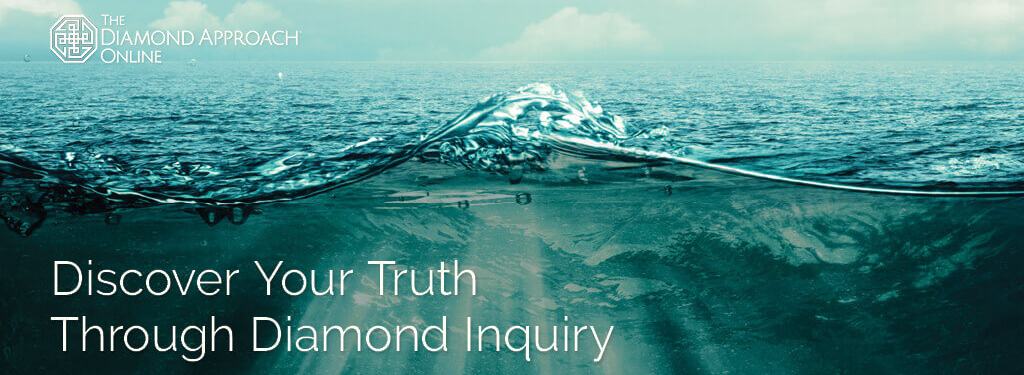Open-ended inquiry empowers the expansion of consciousness
We only have to ask to receive
The fundamental practice of the Diamond Approach is open and open-ended inquiry. This type of inquiry means:
- We are open to exploring our experience in its immediacy
- We are sensitive and vulnerable to the effects of our experience
- Our inquisitive curiosity is open in body, heart, and mind
- We’re willing to leave no stone unturned
- We have no goal, nor desired outcome.
The Power of Open-ended Inquiry
Before addressing dialectic open-ended inquiry, let’s explore the power of open-ended inquiry in general.
When inquiry is open and open ended, it discloses the knowledge that is always available within experience. An open-ended inquiry means that the rigid patterns in our experience can be transformed into fluid patternings of a self-organizing flow. Before we enter into the process of questioning and inquiry, our experience is rigidly patterned; it arises in repetitive, compulsive, obsessive patterns. When we look into and challenge what is determining and fixing these patterns, their rigidity dissolves and our experience starts unfolding in new ways. A. H. Almaas, Spacecruiser Inquiry, ch. 5
In short, inquiry brings the power of awareness to bear on the appearance of things to penetrate beliefs, projections, and old habits. It’s a process of understanding that peels away the layers from the past to get to the immediate phenomenology of what’s happening – what is.
Mental processes like naming and association still happen. Still, as the peeling (inquiry) continues, knowledge and understanding become more and more experiential – you feel it in your bones, you know it in your cells. Knowing moves deeper from the mind into presence.
Dialectic Open-ended Inquiry
Let’s begin with our normal understanding of dialectic.
- The art of investigating or discussing the truth of opinions.
- The existence or action of opposing social forces, concepts
- Etymology of dialectic: from Greek dialektikē (tekhnē) ‘(art) of debate’
Socrates is considered to be the father of dialectic inquiry in Western philosophy. The Socratic method searches for general, commonly held truths that shape beliefs and scrutinizes them to determine their consistency with other beliefs.
Dialectic inquiry involves two or more people, which means there is more than one vantage point engaging in the inquiry. Obviously, this means some variations in beliefs, understanding, history, and perspective between the dialectic poles.

The disparities empower dialectic, open-ended inquiry in two basic ways:
- Bringing contrast and, thus, supporting more subtle discrimination
- Combining the energies and life forces of individuals into a greater field
Dialectic Inquiry Partners
In the Diamond Approach, students develop the interest and capacity for engaging in inquiry 24/7. This might sound like ceaseless mental activity to those unfamiliar with the art of inquiry. Still, when developed, inquiry is less about questions and more about openness to immediate experience.
Diamond Approach students often have one or more inquiry partners. They inquire regularly. What do we see in action in a dialectic inquiry with just two people?
This dance of inquiry involves constantly shifting symmetrical and asymmetrical relationships between vantage points. This is like sifting, sanding, and polishing as one process.
We call this “dialectic inquiry”—there is a dialectic, an interaction of two forces merging together and becoming one vortex, one force. Inquiring into this combined consciousness develops the relationship, and the relationship can become a means of developing the individuals who are in it. A. H. Almaas & Karen Johnson, The Power of Divine Eros
A. H. Almaas & Karen Johnson, The Power of Divine Eros
Focus of Attention in Dialectic Inquiry
In dialectic inquiry, attention is given to one’s personal experience and the experience of the other. Additionally, and perhaps more importantly, attention is also given to the ‘field of experience’ – what does the entire interaction feel like, and what’s the energetic sense of what’s happening?
So, we have a dance within a dance, which results in more and more presence or beingness emerging. One’s sense of self begins to feel more and more transparent. Tension patterns and emotional reactivity relax. Vision, inner and outer, seem to clear and sharpen.

The whole experience can feel like an old, sluggish engine beginning to fire on all cylinders.
In short, dialectic open-ended inquiry is simply two points of reality exploring itself.

In this practical, self-paced audio course, you’ll learn how to explore the ocean of your inner world using a powerful practice called Diamond Inquiry.